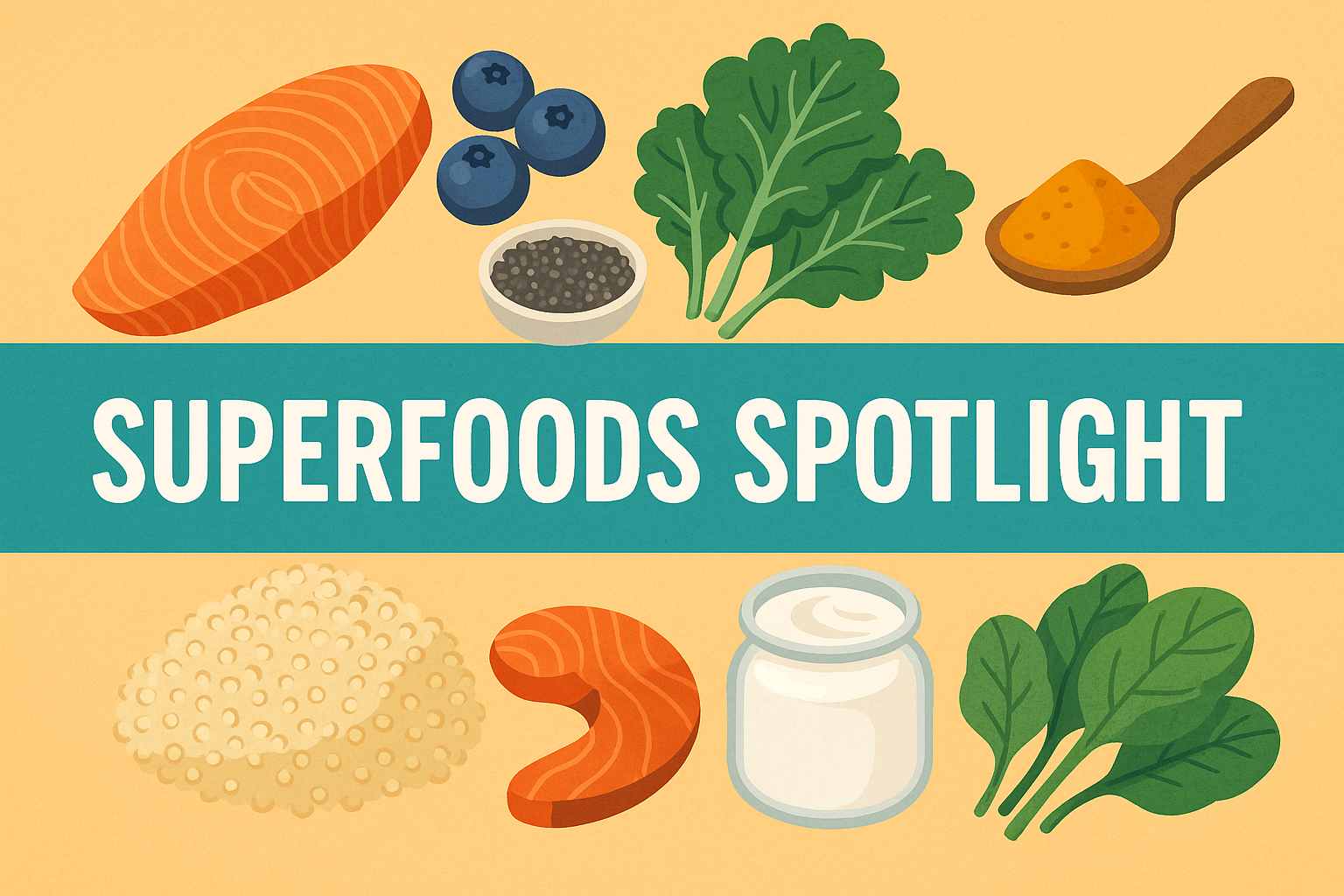From kale to chia seeds, the term “superfoods” gets thrown around a lot, promising outsized health perks in every bite. But do these nutrient-packed powerhouses really deliver? In this superfoods review, we’ll shine a light on seven popular nutrient-dense foods, explore their claimed superfood benefits, and help you decide which ones deserve a permanent spot in your diet.
1. Blueberries
- Nutrition Snapshot: High in antioxidants (especially anthocyanins), vitamin C, and fiber.
- Claimed Benefits: May support brain health, reduce oxidative stress, and improve cardiovascular markers.
- Science Says: Studies link regular blueberry intake to better memory and lower LDL oxidation—though effects often appear at 1–2 cups per day.
2. Kale
- Nutrition Snapshot: Rich in vitamins A, K, C, calcium, and phytonutrients like lutein.
- Claimed Benefits: Supports eye health, bone strength, and detoxification pathways.
- Science Says: Kale’s high vitamin K contributes to bone mineralization, but excessive intake without balanced diet can impact thyroid function due to goitrogens.
3. Chia Seeds
- Nutrition Snapshot: Excellent source of omega-3 ALA, fiber, and plant-based protein.
- Claimed Benefits: Promotes satiety, supports heart health, and stabilizes blood sugar.
- Science Says: Fiber content helps regulate digestion, and small trials suggest modest improvements in cholesterol levels.
4. Quinoa
- Nutrition Snapshot: Complete protein, B vitamins, magnesium, and iron.
- Claimed Benefits: Ideal grain alternative for vegetarians, supports muscle repair, and offers sustained energy.
- Science Says: Quinoa’s protein profile is unique among grains, making it a valuable nutrient-dense food in meat-free diets.
5. Turmeric
- Nutrition Snapshot: Contains curcumin, a potent anti-inflammatory compound.
- Claimed Benefits: May reduce joint pain, improve skin health, and support liver detox.
- Science Says: Curcumin shows promise in reducing inflammatory markers, but absorption is low—pair with black pepper (piperine) or fats.
6. Salmon
- Nutrition Snapshot: Rich in omega-3 fatty acids (EPA/DHA), high-quality protein, and vitamin D.
- Claimed Benefits: Supports heart, brain, and joint health.
- Science Says: Strong evidence for omega-3s reducing triglycerides and supporting cognitive function—aim for 2 servings per week.
7. Greek Yogurt
- Nutrition Snapshot: High in protein, probiotics, calcium, and B12.
- Claimed Benefits: Aids digestion, supports bone health, and enhances muscle recovery.
- Science Says: Probiotic strains can improve gut health, and high protein content contributes to satiety and muscle protein synthesis.
Are Superfoods Essential?
While each of these nutrient-dense foods offers valuable vitamins, minerals, or bioactive compounds, no single ingredient can replace a varied, balanced diet. The real key to health lies in diversity—rotating colors, plant families, and food sources to cover all your nutritional bases.
Tips for Incorporating Superfoods
- Add, Don’t Replace: Fold superfoods into meals you already enjoy—blend berries into oatmeal, top salads with seeds, and stir turmeric into soups.
- Mix & Match: Combine multiple superfoods—like quinoa salad with kale and salmon—for synergy of superfood benefits.
- Watch Portions: Focus on recommended serving sizes; more isn’t always better and can lead to digestive upset.
- Prioritize Whole Foods: Choose fresh, minimally processed versions over supplements when possible.
Conclusion
This superfoods review underscores that while these seven standouts offer unique perks, they should complement—not replace—the broader spectrum of wholesome foods. By weaving these power players into a nutrient-rich tapestry of fruits, vegetables, whole grains, lean proteins, and healthy fats, you’ll truly harness the full range of superfood benefits for lasting health.

